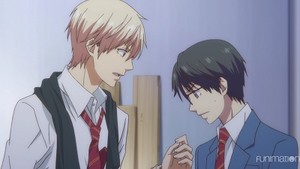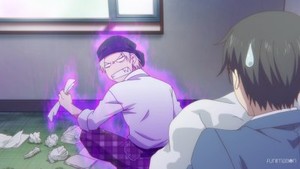The Spring 2019 Anime Preview Guide
Kono Oto Tomare! Sounds of Life
How would you rate episode 1 of
Kono Oto Tomare!: Sounds of Life (TV 1) ?
Community score: 3.5
What is this?
 Takezo joined his high school's koto club on a whim – depressed after failing the exam for his prestigious first choice school, he felt a kinship with the girls of the club as they kept playing through a terrible presentation to the first-years. Now a second-year, Takezo is the sole remaining member of the club and desperate to carry on their legacy. Unfortunately, he's been targeted by bullies who have taken over his club room, and he's not sure that he can stand up to them. Much to his consternation, his savior arrives in the form of Chika Kudo, an infamous delinquent who's believed to have destroyed his grandfather's koto shop last year. Kudo says that he wants to join the club, but Takezo thinks he's just another thug out to take advantage of him. But when Kudo is accused of another crime, Takezo realizes that he's been blinded by his own prejudice. Can he bring himself to do the right thing for the other boy, and maybe save the club in the process? Kono Oto Tomare!: Sounds of Life is based on a manga and streams on Funimation, Saturdays at 1:30 PM EST.
Takezo joined his high school's koto club on a whim – depressed after failing the exam for his prestigious first choice school, he felt a kinship with the girls of the club as they kept playing through a terrible presentation to the first-years. Now a second-year, Takezo is the sole remaining member of the club and desperate to carry on their legacy. Unfortunately, he's been targeted by bullies who have taken over his club room, and he's not sure that he can stand up to them. Much to his consternation, his savior arrives in the form of Chika Kudo, an infamous delinquent who's believed to have destroyed his grandfather's koto shop last year. Kudo says that he wants to join the club, but Takezo thinks he's just another thug out to take advantage of him. But when Kudo is accused of another crime, Takezo realizes that he's been blinded by his own prejudice. Can he bring himself to do the right thing for the other boy, and maybe save the club in the process? Kono Oto Tomare!: Sounds of Life is based on a manga and streams on Funimation, Saturdays at 1:30 PM EST.How's Funimation's SimulDub?
How was the first episode?
 Nick Creamer
Nick Creamer
Rating:
One thing I like about the preview guide is that even in shows that aren't remarkable overall, there are often one or two truly standout qualities that can notably elevate a production. In the case of Kono Oto Tomarei, I found myself very impressed by how efficiently this episode managed to contrast the character arcs for each of its leads, resulting in an episode whose ending felt like the conclusion of a multi-episode arc. To do that without the narrative seeming either rushed or underwritten is no small feat, so hats off to Kono Oto Tomarei for its efficient plotting.
This first episode introduces us to Takezo, the sole remaining member of his school's koto club, and Kudo, a boy known for getting in trouble with the police. When Kudo demands entry into the koto club, Takezo refuses, certain that a delinquent like Kudo is only messing with him. Over the course of this episode, both Takezo's insecurities regarding the club and Kudo's frustration at his own public image evolve and converge, ultimately resulting in a tidy testament to the importance of having people who believe in you.
A great deal of this episode is taken up by pretty familiar club drama setup, and the introductory segment is a little slow, but things pick up by the time we learn about Kudo's relationship with his grandfather. Kono Oto Tomarei's writing isn't truly exceptional, but those two in particular shared a convincing rapport that helped sell the episode's more melodramatic choices. The show's use of some random hooligans at their school to stir drama also felt a little clumsy, but the narrative converges well enough by the end, leaving us with a reasonable rapport between our first two leads.
In terms of visual design, Kono Oto Tomarei is a modest production, with little animation to speak of. The background art is also pretty unappealing, and the character designs fairly generic. I was also a little disappointed that a club show about koto didn't actually find time to include a koto performance in its first episode - both Takezo and Kudo are interested in koto for reasons unrelated to their love of the instrument itself, but it would have been nice to get a demonstration of what Kudo's grandfather saw in these instruments.
On the whole, Kono Oto Tomarei offers a perfectly reasonable premiere that will almost certainly end up tragically buried under a pile of similarly just-okay club dramas. If the koto hook seems interesting, maybe give it a glance, but otherwise this one's probably safe to skip.
 Theron Martin
Theron Martin
Rating:
For a series about a club focused on playing a traditional Japanese instrument, I certainly didn't expect the first episode to be so violent or so deeply-entrenched in heavy drama. The result is a surprisingly intense first episode, undercut by its occasional attempts to also be funny.
Though maybe not one of the core anime archetypes, the Misunderstood Delinquent is still common enough that it's easy to guess from the start that Kudo's fierce reputation isn't fully deserved. Flashbacks show that Kudo was indirectly responsible for his grandfather's place getting trashed in the sense that it was a targeted attack against him. Hence he's got deep regrets buried under his delinquent demeanor that he can't seem to shake. That can make for a compelling character study going forward. By comparison, Takezo is a little more typical as the insecure weakling who sees himself as a perpetual screw-up, but that also means that he's eventually going to see eye-to-eye with Kudo on that level. This potential connection shows a lot of promise, as does the dynamic of one seeking redemption and a connection to his grandfather in the club while the other sees it as a way to prove that he can overcome his own foibles. Three other characters are shown in the opener as joining the club later, but none of them have appeared yet; this episode is all about establishing the duo, as it probably should be.
For as compelling and serious as the drama comes across, the comic asides are rough at best. The series seems to want to be both very serious and comic at the same time but isn't pulling the balance off well so far, as the sudden shifts into comedic artwork are tonally jarring. Of course, there's also the hideous uniform designs to consider. How the original creator thought that plaid pants with a red tie was a good combination is beyond me; I dearly hope they're not modeled on some actual school somewhere. It's not a big distraction as long as the students are wearing the blue jackets (so we don't see the pants and skirts as much), but I had to cringe at the shots in the opener that showed the characters sans jackets. The technical merits are otherwise decent, with generally appealing character designs so far.
So this series has some potential, if it can find a smoother way to execute its story.
 Rebecca Silverman
Rebecca Silverman
Rating:
I may have rated this a bit high, especially because there's no actual koto-playing in an episode about a koto club, but something about Kono Oto Tomare!: Sounds of Life is just so engaging that it felt like the episode flew by. A bit like Mix, this is perhaps better classified as a story about the characters' development with the koto as the instrument of their change. Not that I don't expect it to play a larger role going forward, but as of this episode I suspect it of being more of a catalyst for character work than the central, or at least sole, focus of the show.
That's certainly the case in the series' opening salvo. Both of the ostensible protagonists, Takezo and Kudo, have had the instrument influence their lives. Takezo sort of fell into it; he empathized with the awful performance the club gave at his opening ceremony as a first-year and when he went to compliment them on it, the girls in the club all assumed he was coming to join. Naturally retiring and not necessarily good at saying “no,” Takezo couldn't turn them down. Now as a second-year, he's found himself in the same position they were in last year: he desperately needs new recruits. But unlike the welcoming third-years who have now graduated, Takezo isn't comfortable just asking, or even accepting, anyone who comes by. Largely this seems to be because he's become the target of three bullies, guys who have taken over his club room and threaten him physically on what seems to be a daily basis. It's because of this that he lets his prejudice blind him when a first-year does come knocking.
What's striking is that Takezo is otherwise a seemingly nice guy, and he does do the right thing by the end of the episode. That's important not just because it makes Takezo more likable, but also because it sets the stage for the other protagonist, Kudo, to grow. Chika Kudo has had a tough row to hoe for a long time – we don't know much about his family, but it's strongly implied that he fell in with a bad crowd and was kicked out by his father, winding up with his koto-maker grandfather. I suspect that Kudo's dad was at least part of the reason he was fighting in the first place, and it seems like Grandpa might have thought so, too, going out of his way to help Kudo find a channel for his anger and energy. Naturally that's the koto, a traditional thirteen-stringed instrument played with picks attached to the fingers. (There's a seventeen-stringed version too, but it's too early to tell which they're using.) That no one is willing to believe that Kudo has changed is just part of the tragedy of his life; twice he's framed for koto-destroying crimes and people are all too eager to believe he did it.
That makes the episode's defining moment Takezo listening, and believing, Kudo's one friend and going to stand up for him. It's big for both characters – Takezo has found his courage and taken off his blinders, and Kudo sees someone who once refused to let him in the club really pay attention and take his side. It feels like this will be the basis for the series, and if that comes with koto playing, I'm up for seeing where it goes.
discuss this in the forum (214 posts) |
this article has been modified since it was originally posted; see change history
back to The Spring 2019 Anime Preview Guide
Season Preview Guide homepage / archives